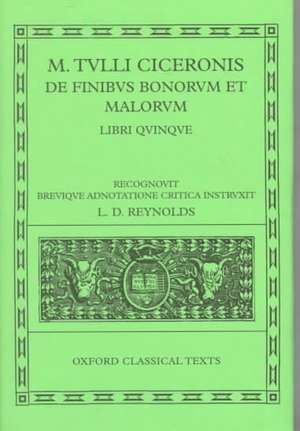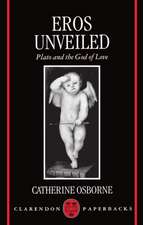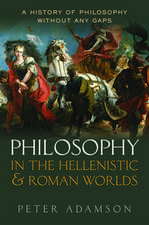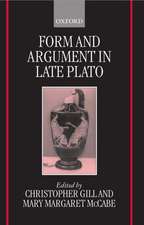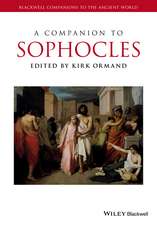Cicero De Finibus Bonorum et Malorum: Oxford Classical Texts
Editat de Leighton Reynolds, L. D. Reynoldsen Limba Engleză Hardback – 8 oct 1998
Din seria Oxford Classical Texts
- 31%
 Preț: 365.65 lei
Preț: 365.65 lei - 20%
 Preț: 131.53 lei
Preț: 131.53 lei - 18%
 Preț: 336.60 lei
Preț: 336.60 lei - 16%
 Preț: 355.35 lei
Preț: 355.35 lei - 27%
 Preț: 175.92 lei
Preț: 175.92 lei - 14%
 Preț: 193.86 lei
Preț: 193.86 lei -
 Preț: 265.31 lei
Preț: 265.31 lei - 22%
 Preț: 337.86 lei
Preț: 337.86 lei - 27%
 Preț: 112.58 lei
Preț: 112.58 lei - 27%
 Preț: 186.63 lei
Preț: 186.63 lei - 27%
 Preț: 200.45 lei
Preț: 200.45 lei - 23%
 Preț: 330.33 lei
Preț: 330.33 lei - 23%
 Preț: 265.92 lei
Preț: 265.92 lei - 18%
 Preț: 334.13 lei
Preț: 334.13 lei - 27%
 Preț: 153.16 lei
Preț: 153.16 lei - 18%
 Preț: 336.01 lei
Preț: 336.01 lei - 26%
 Preț: 131.76 lei
Preț: 131.76 lei - 21%
 Preț: 185.47 lei
Preț: 185.47 lei - 18%
 Preț: 332.23 lei
Preț: 332.23 lei - 26%
 Preț: 423.78 lei
Preț: 423.78 lei - 27%
 Preț: 184.08 lei
Preț: 184.08 lei - 27%
 Preț: 136.84 lei
Preț: 136.84 lei - 28%
 Preț: 196.61 lei
Preț: 196.61 lei - 24%
 Preț: 262.42 lei
Preț: 262.42 lei - 22%
 Preț: 334.60 lei
Preț: 334.60 lei - 22%
 Preț: 183.24 lei
Preț: 183.24 lei - 34%
 Preț: 568.80 lei
Preț: 568.80 lei - 22%
 Preț: 153.79 lei
Preț: 153.79 lei - 16%
 Preț: 336.01 lei
Preț: 336.01 lei - 28%
 Preț: 182.10 lei
Preț: 182.10 lei - 26%
 Preț: 185.03 lei
Preț: 185.03 lei - 21%
 Preț: 313.09 lei
Preț: 313.09 lei - 21%
 Preț: 201.05 lei
Preț: 201.05 lei - 18%
 Preț: 283.56 lei
Preț: 283.56 lei - 19%
 Preț: 331.30 lei
Preț: 331.30 lei - 18%
 Preț: 335.08 lei
Preț: 335.08 lei - 27%
 Preț: 136.80 lei
Preț: 136.80 lei - 23%
 Preț: 267.15 lei
Preț: 267.15 lei - 27%
 Preț: 184.39 lei
Preț: 184.39 lei - 18%
 Preț: 335.39 lei
Preț: 335.39 lei - 26%
 Preț: 166.36 lei
Preț: 166.36 lei - 23%
 Preț: 224.54 lei
Preț: 224.54 lei - 20%
 Preț: 164.71 lei
Preț: 164.71 lei - 21%
 Preț: 143.43 lei
Preț: 143.43 lei - 26%
 Preț: 181.48 lei
Preț: 181.48 lei - 21%
 Preț: 182.64 lei
Preț: 182.64 lei - 27%
 Preț: 139.99 lei
Preț: 139.99 lei - 27%
 Preț: 199.44 lei
Preț: 199.44 lei - 22%
 Preț: 197.18 lei
Preț: 197.18 lei - 18%
 Preț: 345.92 lei
Preț: 345.92 lei
Preț: 278.62 lei
Preț vechi: 339.72 lei
-18% Nou
Puncte Express: 418
Preț estimativ în valută:
53.31€ • 55.80$ • 44.37£
53.31€ • 55.80$ • 44.37£
Carte disponibilă
Livrare economică 26 februarie-04 martie
Preluare comenzi: 021 569.72.76
Specificații
ISBN-13: 9780198146704
ISBN-10: 0198146701
Pagini: 260
Dimensiuni: 129 x 194 x 19 mm
Greutate: 0.33 kg
Ediția:Revised
Editura: OUP OXFORD
Colecția OUP Oxford
Seria Oxford Classical Texts
Locul publicării:Oxford, United Kingdom
ISBN-10: 0198146701
Pagini: 260
Dimensiuni: 129 x 194 x 19 mm
Greutate: 0.33 kg
Ediția:Revised
Editura: OUP OXFORD
Colecția OUP Oxford
Seria Oxford Classical Texts
Locul publicării:Oxford, United Kingdom
Recenzii
After the late Mr Reynolds's editions of Seneca (Letters and Dialogues) and Sallust in the Oxford series, the merits of this one come as no surprise ... technically flawless, lucid, economical, carefully researched, judiciously selective, but reasonably hospitable.
user-friendly page layout. Andrew M. Riggsby, Religious Studies Review, Vol.26, No.3.
Finally we have from the pen of the late L.D. Reynolds... a critical edition to take its place on our shelves as a fully worthy companion beside Madvig's commentary... The chief of R.'s improvements is to the stemma... R.'s Fin. is the second volume in a projected complete edition for OCT of Cicero's philosophical corpus. One point shared with its series predecessor M. Winterbottom's De Officiis, is clarity of layout, whereby the needed information is set before the reader without the clutter of the dubiously relevant.
user-friendly page layout. Andrew M. Riggsby, Religious Studies Review, Vol.26, No.3.
Finally we have from the pen of the late L.D. Reynolds... a critical edition to take its place on our shelves as a fully worthy companion beside Madvig's commentary... The chief of R.'s improvements is to the stemma... R.'s Fin. is the second volume in a projected complete edition for OCT of Cicero's philosophical corpus. One point shared with its series predecessor M. Winterbottom's De Officiis, is clarity of layout, whereby the needed information is set before the reader without the clutter of the dubiously relevant.
